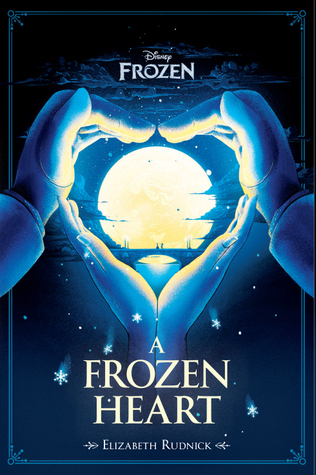You just never know. The moment I went to put A Frozen Heart on the new books shelf, an 8th grade girl grabbed it, clutched it to her chest, and rapturously checked it out. Apparently a good choice to have in the library.
Semi-shameful side note, when my girls were young, I was so adamant that they have as little screen time as possible (no more than 30 minutes of television or an educational computer game like Millie's Math House) that I didn't let them watch any Disney movies. I wanted them to be able to converse on pop culture, though, so I let them read the Grolier Disney books that I picked up at the thrift store for a quarter. This lead to interesting twists on the stories. My older daughter was horrified that Sleeping Beauty's mother did not have a name, so she created one: Thrimbaba. I had to make sure that I always included her name when I read the book! We also added endings where Cinderella decided not to marry the prince, but to go back to school to major in corporate accounting and Snow White went on to major in environmental science so she could become a forest ranger-- clearly, those woods were not safe and there needed to be someone in charge!
I was out of work and at home for nine years. Had to do something to keep mentally sharp!
 Rudnick, Elizabeth. A Frozen Heart
Rudnick, Elizabeth. A Frozen HeartOctober 13th 2015 by Disney Press (first published May 26th 2015)
Copy provided by Young Adult Books Central
Elsa and Anna are great friends when very young, but an accident caused by Elsa's powers makes her cut herself off from her sister. Once their parents are killed in an accident, Anna's life becomes even more lonely and boring. When she meets Hans during Anna's coronation, she thinks she has found a way out of her boring existence, but Elsa is opposed to such a violent extent that she unleashes her powers of ice and freezes Arendelle. She runs away, and Anna takes off after her, leaving Hans in charge of the town. Eventually, she runs into Kristoff, who normally sells ice but whose business is thrown off by Elsa's sudden climate change. He reluctantly agrees to help Anna find her sister, but there are many obstacles in the way. When tragedy strikes, Hans turns out to be an untrustworthy character, and the solution lies in an unexpected corner.
Strengths: This is strong action/adventure book and a good look at the difficult relationship that sisters have. I liked how Hans was painted rather sympathetically, since his older brothers and father were not particularly nice to him, and he did his best to run the kingdom, even though he didn't have the best motivations. For an adaptation of a movie for younger children, I thought this struck a good balance. Readers of Levine's Two Princesses of Bamarre and other fairy tale retellings will enjoy this.
Weaknesses: Elsa didn't get nearly enough backstory or attention.
Verdict: I don't know that I would have spent money on this, but it's actually fairly well written, so I'm glad to put it in the library. I do have 6th graders who still wear Frozen t shirts, and the print is rather small for them, but it holds up well as a fairy tale retelling.
Moses, Will. Fairy Tales for Little Folks
September 15th 2015 by Viking Books for Young Readers
Copy provided by Young Adult Books Central
The simple retellings and elaborate two-page picture spreads of classic fairy tales make this picture book a good introduction to stories to which all children should be exposed. Little Red Riding Hood, Beauty and the Beast, Rumplestiltskin, Snow White, and Puss in Boots are recounted in straight-forward adaptations of traditional European versions of these tales. Each merits a four to six page retelling, with two to three thumbnail drawings accompanying the text, followed by an elaborate two page spread after each story. The spreads are very detailed, and young readers will spend many happy hours locating events and characters in each one. Since the book has five tales, and the text is somewhat dense, this would also work well for older students who need to have classic tales for various projects. The folk art of Moses has an old-fashioned quality that complements the stories.
Strengths: This is a good introduction to fairy tales, with very colorful and detailed folk-style illustrations.
Weaknesses: Since I have read lots of folk and fairy tales, I am always looking for either culturally diverse collections or annotated stories with some insight into their geneses. This didn't even reference which versions (Grimm, Perrault, etc.) were retold.
What I really think: This reminded me of collections from the 1970s. I'm not a fan of folk art, and this would have been a difficult picture book to read with my own children, who had a rather short limit when it came to the amount of words that had to be read before the pages were turned. That said, it will work fairly well for the 6th grade fairy tale unit, where the students have to take a standard tale and set it in another country.

No comments:
Post a Comment